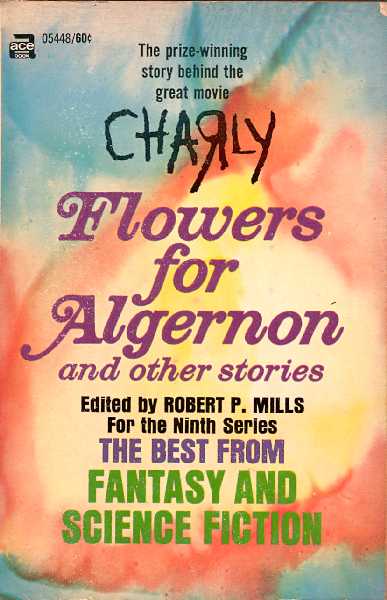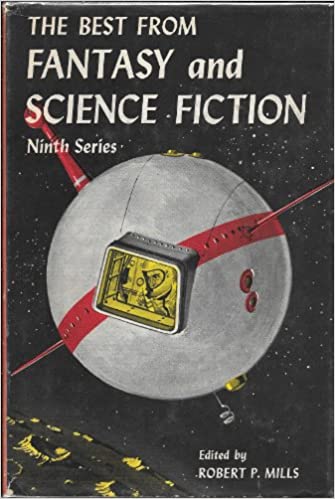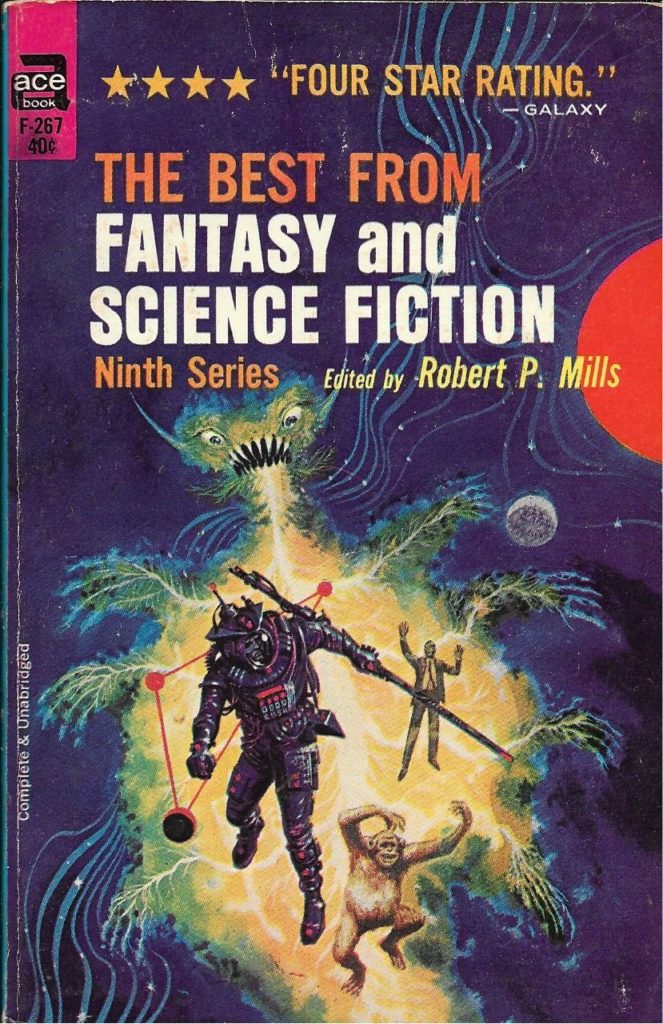


The Best From Fantasy and Science Fiction, Ninth Series is the first volume NOT edited by Anthony Boucher. But Robert P. Mills may have edited the best volume of the series simply because it includes the classic Flowers for Algernon. Flowers for Algernon was expanded into a novel by Daniel Keyes and later became the movie, Clarly. It’s the story a man who takes an experimental drug that increases his intelligence.
On top of Flowers for Algernon, this volume also includes Robert A. Heinlein’s time-twisting “All You Zombies…” You would think that would be enough to put this Ninth Series volume into the top tier of this series…but wait, there’s more!
Other top-notch stories: “Casey Agonistes,” by Richard McKenna, “What Rough Beast,” by Damon Knight, “The Pi Man,” by Alfred Bester. And then there’s one of Theodore Sturgeon’s best stories, “The Man Who Lost the Sea.”
The Best From Fantasy and Science Fiction, Ninth Series is the best volume in this series so far and is full of excellent stories! Don’t miss this one! GRADE: A
TABLE OF CONTENTS:
- 7 • Introduction (The Best from Fantasy and Science Fiction: Ninth Series) • (1960) • essay by Robert P. Mills
- 9 • Flowers for Algernon • (1959) • novelette by Daniel Keyes
- 22 • Through Time and Space with Ferdinand Feghoot: XI • [Through Time and Space with Ferdinand Feghoot • 11] • (1959) • short story by Reginald Bretnor [as by Grendel Briarton]
- 41 • Me • (1959) • poem by Hilbert Schenck
- 42 • A Different Purpose • (1958) • short story by Kem Bennett
- 62 • A Vampire’s Saga • (1959) • poem by Norman Belkin
- 63 • Ralph Wollstonecraft Hedge: A Memoir • (1959) • short story by Ron Goulart
- 67 • Sportsman’s Difficulty • (1959) • poem by Doris Pitkin Buck
- 68 • “All You Zombies …” • (1959) • short story by Robert A. Heinlein
- 81 • An Expostulation • (1959) • poem by C. S. Lewis
- 82 • Casey Agonistes • (1958) • short story by Richard McKenna [as by R. M. McKenna]
- 94 • Through Time and Space with Ferdinand Feghoot: XII • [Through Time and Space with Ferdinand Feghoot • 12] • (1959) • short story by Reginald Bretnor [as by Grendel Briarton]
- 95 • Eastward Ho! • (1958) • short story by William Tenn
- 112 • Through Time and Space with Ferdinand Feghoot: XIV • [Through Time and Space with Ferdinand Feghoot • 14] • (1959) • short story by Reginald Bretnor [as by Grendel Briarton]
- 114 • Soul Mate • (1959) • short story by Lee Sutton
- 130 • Call Me Mister • (1959) • poem by Anthony Brode
- 131 • What Rough Beast? • (1959) • novelette by Damon Knight
- 156 • Classical Query Composed While Shampooing • (1959) • poem by Doris Pitkin Buck
- 157 • Far from Home • (1958) • short story by Walter Tevis
- 161 • Space Burial • (1959) • poem by Brian W. Aldiss
- 162 • Invasion of the Planet of Love • [Venus/Earth Conflict] • (1959) • short story by George P. Elliott
- 173 • Through Time and Space with Ferdinand Feghoot: X • [Through Time and Space with Ferdinand Feghoot • 10] • (1959) • short story by Reginald Bretnor [as by Grendel Briarton]
- 174 • Dagon • (1959) • short story by Avram Davidson
- 184 • Pact • (1959) • short story by Poul Anderson [as by Winston P. Sanders]
- 200 • To Give Them Beauty for Ashes • (1959) • poem by Winona McClintic
- 201 • No Matter Where You Go • (1959) • short story by Joel Townsley Rogers
- 223 • The Willow Tree • (1959) • short story by Jane Rice
- 233 • Through Time and Space with Ferdinand Feghoot: XIII • [Through Time and Space with Ferdinand Feghoot • 13] • (1959) • short fiction by Reginald Bretnor [as by Grendel Briarton]
- 234 • The Pi Man • (1959) • short story by Alfred Bester
- 252 • The Man Who Lost the Sea • (1959) • short story by Theodore Sturgeon
- 264 • Through Time and Space with Ferdinand Feghoot: XV • [Through Time and Space with Ferdinand Feghoot • 15] • (1959) • short story by Reginald Bretnor [as by Grendel Briarton]
Lot of great stories here:
The Pi Man by Alfred Bester
Eastward Ho by William Tenn
What Rough Beast by Damon Knight
All You Zombies by Robert Heinlein
Flowers For Algernon by Daniel Keyes
Dagon by Avram Davidson
Casey Agonistes by Richard McKenna
These are the ones I remember
Still wish they would have left out all the Ferdinand Fehfoot bits and the poems.
The best in the series up till now.
Steve, I totally agree! The Ninth Series sets the bar very high with so many quality stories. I’m with you on the Ferdinand stuff and the lame poems. Just stick to the stories!!!
I actually have read FLOWERS FOR ALGERNON but only the drug to increase intelligence is a fantastical element if I remember correctly. Boy, I wish there was one to administer to half this country.
Spoiler, if you’ve never come across a version of the story…
Alas, the improvement on the intelligence is temporary, and it makes things eventually worse. It’s easy to joke that too many peers are on the downward slope.
Todd, “Flowers for Algernon” is a tragic story that resonated with a lot of readers. It morphed into a bestselling novel…and then a movie.
Cliff Robertson had to fight pretty hard to get the film CHARLY made.
Todd, Cliff Robertson knew what he was doing when he fought for that CHARLY role. He delivered a memorable performance!
Robertson didn’t have to campaign for the role…he had done the tv version (so Ace missed their chance to mention “The Two Worlds of Charlie Gordon” on the cover), and this is how WIKI currently has the story:
Development
[Photo from the 1961 television presentation “The Two Worlds of Charlie Gordon”, with Mona Freeman in the role of Alice.]
The short story Flowers for Algernon had previously been the basis of “The Two Worlds of Charlie Gordon”, a 1961 television adaptation in which Robertson had also starred for CBS’s U. S. Steel Hour. Robertson had starred in a number of TV shows which were turned into films with other actors playing his role, such as The Days of Wine and Roses. He bought the rights to the story, hoping to star in the film version as well.
He originally hired William Goldman to write the screenplay on the strength of Goldman’s novel No Way to Treat a Lady, paying him $30,000 out of his own pocket. Robertson was unhappy with Goldman’s work and then hired Stirling Silliphant to do a draft.
Robertson did the role for only $25,000.
Todd, thanks for the info! Even though Robertson only made $25,000 his stock as an actor certainly went up after that role!
Patti, we have plenty of evidence that intelligence can be warped. Just look at Ted Cruz, Josh Hawley, and other Ivy Leaguers who attended top schools…but do incredibly stupid things!
George W. Bush. When they aren’t “legacies”, they’re often “throats” (as in cutthroats). One of the most obtuse members of my homeroom in high school made his way up the weasel ladder to important appointed posts in LA politics. Democrat, fwiw. What it’s worth has been devalued considerably in the last fifty-sixty years, not that it was ever what one might call aspirational, with the rise of the neoliberals. And there’s never been any lack of heartless aspirants as well as spoiled heirs in the Ivys…see a certain William J. Clinton.
I’ve read “Flowers for Algernon” and the Heinlein and TEvis and Bester stories, at least.
Jeff, I remember when “Flowers for Algernon” came out as a novel. I recommended it to a girl in Junior High School that I had a crush on and she read it. She came in the next day and said she cried all night after she finished the book. Needless to say, I made no headway after that incident…
Well, she was half-right for you, George! Worth the shot.
Todd, my batting average with girls back in Junior High School was ZERO! I did a bit better in High School!
All sympathies. College women were the first to find me interesting enough.
Todd, like you I had much more success with women in College.
And apologies for managing to not retain the fact she was a JHS peer! (And for so much chatter. Albeit it’s my trademark at times.)
Pretty sure I was subscribing to F & SF during the period covered by this volume because I remember at least all the famous stories included. Great idea about the intelligence increasing drug, Patti. But probably the ones who need it the most would refuse to take it because of something they read on Facebook.
Michael, many hospitals in our area are facing staff shortages as the deadline for the requirement for all hospital personal to be vaccinated looms.
And why medical professionals would balk at vaccination, even given Big Phrama deserves little slack, is a damned good question. Can’t be that many Christian Scientists in the fields.
Todd, so many people seem to see the Covid-19 vaccines as part of some conspiracy. I had one person at the Pool tell me that Bill Gates was injecting people getting the vaccine with a computer chip! Nutty!
Yes, as you’ve already seen in comments, George, the Bester and Tevis stories have a Lot of advocates, too. Tevis named his only story collection till any time now after “Far From Home”, after all…and one of the two editions of THE BEST FANTASY STORIES FROM F&SF had a jacket cover inspired by the Tevis…Mills, who was assistant editor for ELLERY QUEEN’S MYSTERY MAGAZINE and F&SF, and doing gangbusters work on VENTURE SCIENCE FICTION and BESTSELLER MYSTERY when he succeeded Boucher, was a pretty damned impressive editor. As were essentially all F&SF editors, but Mills one of those least credited.
Wow. This seems like a lot more than three years ago…Can’t Imagine Why. The Mills book and the Margulies/? WEIRD TALES anthology THE UNEXPECTED…
https://socialistjazz.blogspot.com/2018/06/ffb-unexpected-edited-by-leo-margulies.html
Todd, thanks for the link! Yes, I remember your posting from three years ago. You were ahead of your Time!
Nah. Just a guy who loves what he loves. FFB is not so much for the Cutting Edge as for the Neglected Tools of Great Use.
Todd, that was a nice match of books in that three-year-old post!
Thanks! It seemed so to me. D. R. Bensen, the probable editor for Margulies (and the editor at Pyramid in those years) is another undersung hero.
Todd, I was a big fan of Pyramid Books in the 1960s. I bought a lot of books in their SF and Fantasy lines. Loved the cover artwork on many of their offerings!
Also useful to know:
The Best from Fantasy and Science Fiction: Ninth Series ed. Robert P. Mills (Doubleday LCC# 52-5510, 1960, $3.95, 264pp, hc)
Also as Flowers for Algernon and Other Stories (Ace, 1966); British editions omit Feghoots [pun vignettes], Ace pb editions omit Feghoots and the poetry by Schenck, Buck, Belkin and Brode; retained are the Lewis, Aldiss and McClintic poems; Mills’s headnotes also removed.
–I don’t mind Feghoots that aren’t too rude…
Todd, ACE frequently puts “Complete and Unabridged” on the cover of their books, but as you point out, it isn’t so.
Todd, I agree with you on Mills. Until I started reading the entire BEST OF FANTASY AND SCIENCE FICTION series, I assumed Boucher would be the best editor. Now, I’m starting to change my mind as I read more of stories and volumes Mills edited.
Avram Davidson is getting the most nonsense critique from most web reviewers these years, and was indeed an idiosyncratic editor, but still my favorite…Edward Ferman being probably the Other most undercredited, despite winning multiple Hugos for best magazine and best editor during his longest (so far) tenure.
Todd, I’ll be getting to the Ferman volumes in the series in a few months!
I’ve read that Sturgeon story in several anthol, and each time it feels very strange to me;such an odd story, but memorable.
Rick, you’re right about “The Man Who Lost the Sea.” Very haunting…
That Sturgeon being his one inclusion in BEST AMERICAN SHORT STORIES for its year. Two stories from F&SF so far in BAMS, both from the ’50s…the other was “Dead Center” by Judith Merril.
Todd, the late 1950s was about the time Science Fiction started to penetrate the Literary World.
It still amuses me that the CHARLY tie-in edition of this book essentially has three titles.
Todd, I always thought the tie-in edition of CHARLY tried to cover all the bases.
Hard to see how they could do more!
“The story that was expanded to the novel that probably ended George Kelley’s chances with his high-school crush!”
Micro-targeting.
Todd, I blame the novel version of FLOWERS FOR ALGERNON for striking out with that girl in Junior High School!
Fond memories again!
I was still a teenager when I read Flowers for Algernon and some of the other stories like Zombies – in German translation of course.
Those were so moving and made me think about reality.
Wolf, Science Fiction as a genre started to hit its stride by the end of the 1950s. SF became much bigger and more impactful in the 1960s.
I also started really reading masses of SF around 1960 when the first SF paperbacks appeared – often translated by fans.
Before that we had only pulps – a standard format of 64 pages.
Ok one page had a bit more content than a typical book page but still …
Sometimes they just left the end or shortened it so much that you didn’t get the real meaning of the novel.
Wolf, the number of SF paperbacks published increased each year during the 1960s. By the 1970s, SF novels were appearing the the Best Sellers Lists.
Rather OT but promising:
The British Guardian just gave the new movie Dune 5 out of five stars calling it brilliant.
https://www.theguardian.com/film/2021/sep/03/dune-review-denis-villenueve-venice-film-festival
Wolf, I would have to give the marketing of the new DUNE movie five stars. I receive email from them daily!